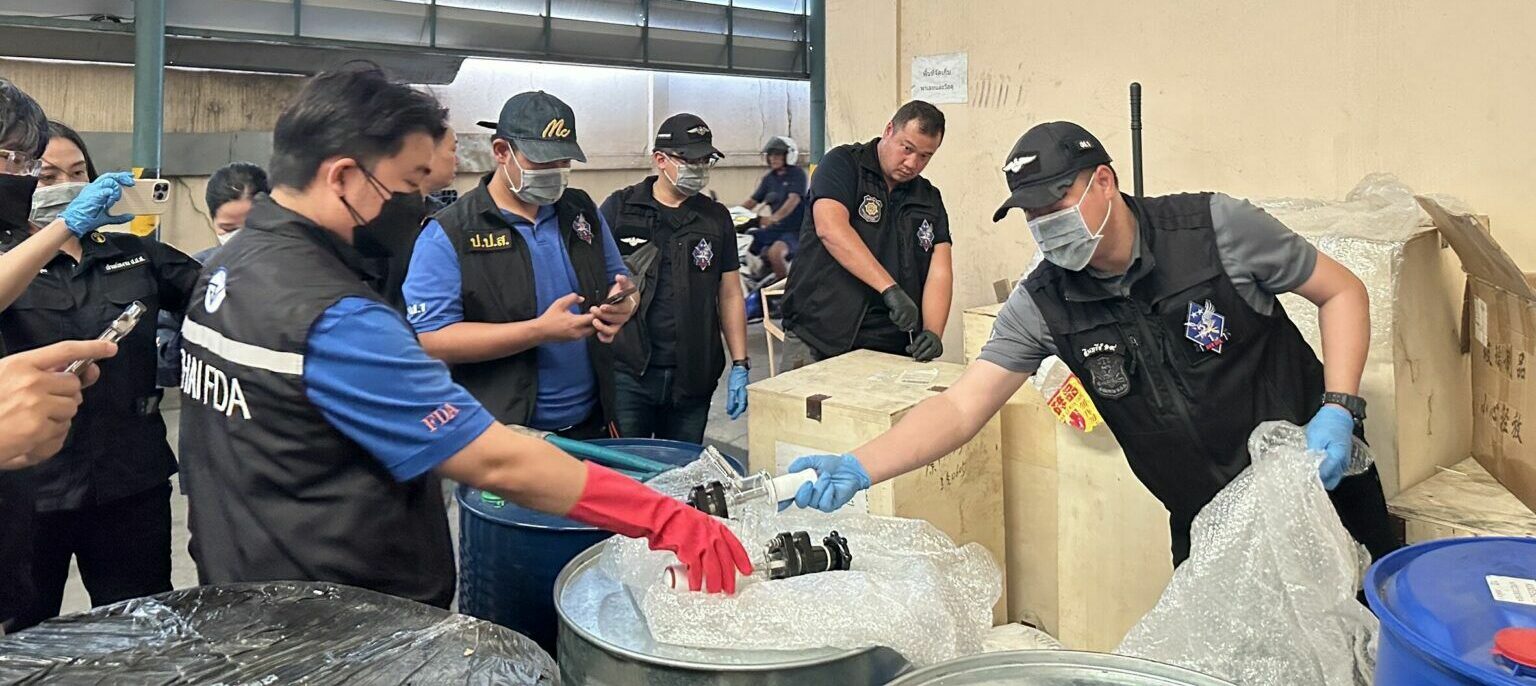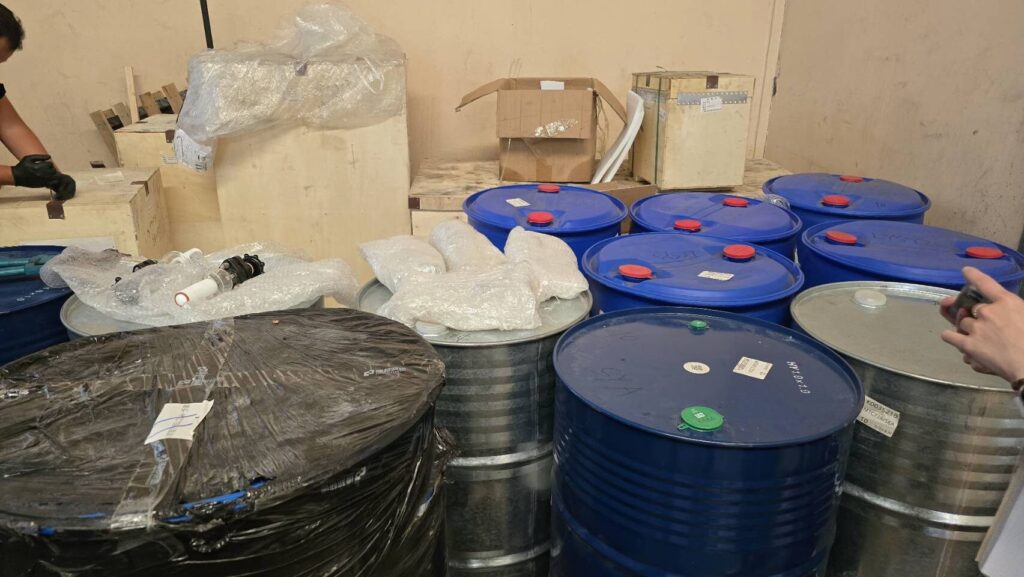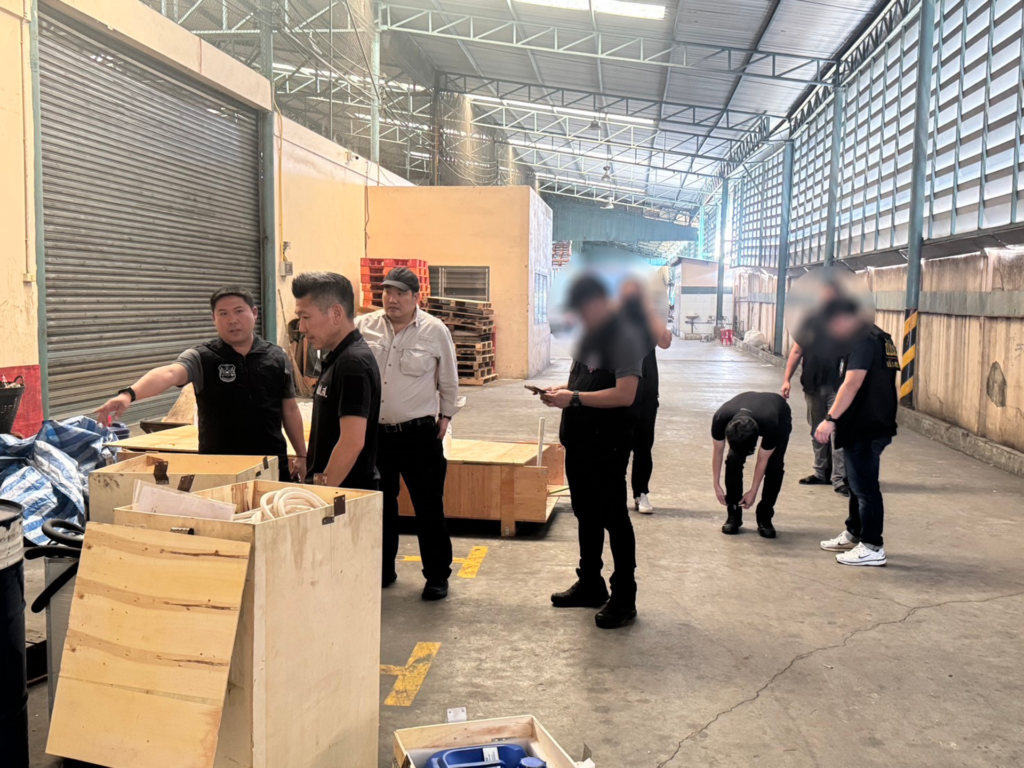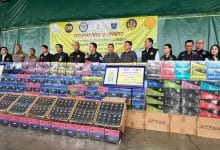Thai police seize chemicals for illegal Etomidate e-cigarette mix

Bangkok police yesterday seized chemicals used to produce the drug Etomidate, which is being illegally mixed with e-cigarettes. This operation uncovered enough materials to create 600,000 units of the dangerous substance, capable of causing respiratory failure. The pursuit of four Chinese nationals involved is currently underway.
At 1.30pm yesterday, December 12 a press conference was held at the Office of the Narcotics Control Board in Bangkok, led by Phanurat Lakboon, the Secretary General of the Narcotics Control Board. Alongside him were Prinn Mekhanand, the Director of the Narcotics Suppression Bureau, and Hattakornnan Siratanapornpat, the Deputy Chief of the Naval Operations Drug Suppression Centre.
Representatives from the Food and Drug Administration, the Department of Industrial Works, the Consumer Protection Police Division, the Central Investigation Bureau, the Naval Intelligence Department, and the National Narcotics Control Commission from China also participated.
The operation stemmed from a previous arrest on December 6, which led to the discovery of precursor chemicals used to create Etomidate, a drug increasingly consumed through e-cigarettes. Phanurat reported that on October 30, the Chinese National Narcotics Control Commission shared crucial information about suspects arrested in China with Etomidate.
Investigations revealed that a network of four Chinese individuals had ordered 3.5 tonnes of various chemicals from China, smuggling them into Thailand.
This intelligence prompted collaboration with the Narcotics Suppression Bureau and the Naval Intelligence Department, leading to the identification of a storage facility in the Samae Dam area of Bangkok. On December 11, a coordinated raid, involving multiple agencies including the NNCC, uncovered the warehouse leased by Chinese nationals.

Etomidate seizure
Seven types of chemicals were seized: phenylethylamine, triethylamine, benzene, ethyl chloroacetate, formic acid (85%), ethyl formate, and potassium thiocyanate, amounting to 11 tanks with a volume of 2,200 litres. These could potentially produce 200 kilogrammes of Etomidate and mix with up to 600,000 e-cigarettes.
Phanurat elaborated that these chemicals are used in making Etomidate, confirming testimonies from the Chinese suspects investigated in October. The chemicals and equipment were intended for production in Thailand.
Etomidate is a controlled substance under the Thai Drug Act of 1967, requiring FDA permission for import, possession, or production. The seized chemicals, with an estimated production value of 200 kilogrammes, are worth approximately 30 million yuan or 140 million baht (US$4.1 million) in China, said Phanurat.
“Etomidate is a short-acting anaesthetic that must be administered by medical professionals. Misuse has been noted, particularly in e-cigarettes, spreading in China. Consumption can lead to severe symptoms such as tremors, loss of balance, permanent neurological damage, or even respiratory arrest.”
The Office of the Narcotics Control Board is committed to preventing the illicit importation and transportation of precursor chemicals.
Despite Etomidate not being classified as a drug under Thai law, its prevalent misuse in China and Taiwan is concerning. If widespread mixing with e-cigarettes occurs in Thailand, the Board will consider proposing its classification as a Schedule II controlled substance.
There have been instances in Thailand, including a 2022 discovery in a Thonglor nightclub involving Chinese, Malaysian, and Filipino nationals. Although Etomidate was found with other drugs and e-cigarettes, it marked the first detection in such a context in Thailand, added Phanurat.
“Should the seven chemicals be used illicitly, evidence will be gathered to seek arrest warrants for their production and distribution. The suspects’ confessions and evidence will support requests for judicial action.”
Prinn further revealed that the chemicals were imported in October, with no prior incidents recorded. The four Chinese suspects linked to this chemical batch remain at large in Thailand, with ongoing efforts to locate them. Their background includes drug-related charges in China and involvement with Etomidate, reported KhaoSod.
The warehouse used for storage was leased without the owner’s knowledge of its illegal use, as the Chinese suspects arranged the chemical shipments and storage independently.
The owner cooperated by reporting suspicious activity, enabling authorities to link the suspects to the operation. The chemicals were imported by sea, and efforts are underway to apprehend the Chinese nationals for extradition to China.

Latest Thailand News
Follow The Thaiger on Google News:


























